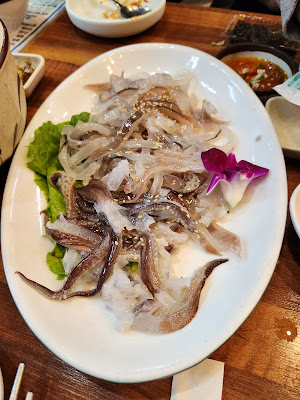Debates over tentacled creatures
Cephalopods
play an important role in Korean seafood dishes and they are one of my (and
Leo’s) favorite dishes. Currently, the global octopus trade is worth over 2.7
billion $.
Recently,
there are heated debates over octopuses as food ingredients and their farming.
The debates over these tentacled animals have started when the Spanish company
‘Nueva Pescanova’ revealed its proposal to open an octopus farm in a harbor in
Las Palmas in the Canary Island in 2021. According to media coverages, this
proposal is the largest private investment in the history on the island. In the
same year ‘Compassion in world farming’ released a report, arguing that octopus
farming is cruel and could cause environmental damage to oceans. The report
mentions that the experimental trials to farm octopuses reveal that the
mortality rate in these systems would be around 20%, meaning that 1 in 5
individuals would not survive the whole production cycle.
People
against the farming plan mentioned that they feared several practices put
forward by the company.
1) Killing
octopuses using ice slurry is a highly aversive and inhumane method and
scientifically proven to cause considerable pain, fear, and suffering as well
as prolonged death
2) Confined
in crowed, barren underwater tank that will result in poor welfare and risk of
territorial aggression and even cannibalism due to the octopuses’ naturally
solitary lifestyle.
3) Exposing
to round-the-clock light to increase reproduction, which will cause undue
stress
4) Feeding
with commercial feeds is unsustainable and contributes to the overfishing of
wild populations of sea creatures that are used to make feeds
5) Raising
within a land-based systems may cause risk of mass mortality and excessive use
of energy, detrimental to the environment
However, the
proponents of the farming maintain that the proposed method is sustainable and
will reduce pressure on wild populations of octopus. As you may also know,
octopuses and other cephalopods have become increasingly popular foods in
recent decades, causing remarkable decrease in numbers of wild octopus. Octopuses
caught around the world reached 400,000 tons (in 2015), which is 10 times more
than in 1950. Based on such statistics, the company argues that there is a need
for octopus farming. Officials from the company cited the results of studies
conducted by Spanish institute of oceanography; it has been shown that
octopuses adapt normally to group living environment without territorial
aggression.
As being an
adventurous foodie, a tropical fish hobbyist, and a pet lover, I am absolutely
against eating dogs, but I think that any sea creatures that are not endangered
could be considered ingredients of sea foods. Octopuses have long been one of
the favorites of many gourmets around the world and there seem to be consensus
that catching and cooking them is acceptable practices. Octopuses are rich in
protein, amino acid, vitamins, minerals and low in fat, making them further
desirable. What we need may be more studies to mitigate negative impacts of
farm growing and investigate better ways to mass product. Usage of regenerative
energy sources must be considered to power the aquacultural systems.
As is the
case with any issues regarding animal welfare, I think current debates have
deeper and profound roots. It is tricky to tell you which animals can be killed
for foods without sense of guilt. To survive, living creatures always need to
hunt other living creatures. Obviously, not a single life on this planet is
free from this fact. And simply plants can not scream does not mean they are
lifeless thus vegetarians are not free from this inevitability at all.






Comments
Post a Comment